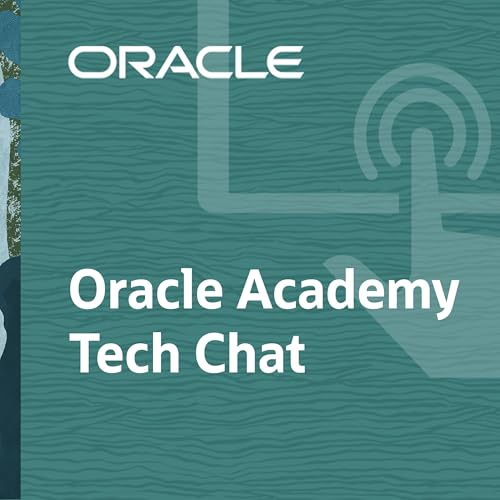In this Episode Orlaith Lawton speaks with Oracle ACE Roberto Capancioni about the importance of APEX and why it is the world's most popular low-code application platform. ------------------------------------------------------ Episode Transcript: 00:00:00:00 - 00:00:35:14 Unknown Welcome to the Oracle Academy Tech Chat. This podcast provides educators and students in-depth discussions with thought leaders around computer science, cloud technologies, and software design to help students on their journey to becoming industry ready technology leaders of the future. Let's get started. Hello and welcome to Oracle Academy Texas, where we discuss how Oracle Academy prepares the next generation's workforce. 00:00:35:15 - 00:01:03:22 Unknown I'm your host Orlaith Lawton. In this episode, we dive into the transformative power of the low code software development and explore how it's reshaping industries, streamlining workflows, and enabling faster innovation. Our guest today is Oracle Ace Roberto Journey, and he shares his expertise on Oracle Apex, the world's most popular low code application platform. You're very welcome, Roberto. 00:01:04:02 - 00:01:34:01 Unknown Lovely to talk to you. And thank you so much for being our guest today on our podcast. Start off, Roberto, can you please give me a little bit about your background and your current job role? Thank you all for inviting me. If I'm open for me to be here with you and to share my knowledge in Oracle Apex and the Oracle technology in general, because I'm very, enthusiast of these environments. 00:01:34:01 - 00:02:37:17 Unknown And I try to explain why. My name is Roberto. I'm, I'm an engineer, and, I've been working in, in I.T for about 30 years. I started, focusing in databases or relational databases and, application development that many years ago for multi utility companies, also in, service sectors company. At the moment I work with mainly exclusively in apex project because they're a when I found the apex about 15 years ago, I thought that it was the, the only take for developing application in, in my career and the, in the the following of this podcast, I try to explain, explain why I also collaborators, 00:02:37:19 - 00:03:14:13 Unknown as a trainer and the also a consultant with companies and also education institution. So, I'm, I'd like to explain to student mainly to student and school because I think that at the moment the there is the need of this kind of, example of code of, the middle word technology, because, Oracle technology is suitable for company and also for educational institutions. 00:03:14:15 - 00:03:48:01 Unknown Thank you, Roberto, for that. And what is apex and what are the benefits of using Apex? Okay. In the apex is the, so-called low code development platform. Why low code look on? Because it the code at the moment is, mainly. And the hype word because the when you say low code, do you want to say that everybody can develop, quick and dirty applications. 00:03:48:03 - 00:04:30:01 Unknown And if you want, the apex can also do that. You can, develop in about an hour a very simple application. But the, the secret is that is also low code application. So it's suitable for business user, for student, for junior developers and also for enterprise applications or grades of housing because the technology that is below apex, that is the Oracle database is an enterprise platform. 00:04:30:01 - 00:05:16:07 Unknown So every company can leverage of database and the, the, low code, the environment, the to develop to develop application. So the secret is that, if you know, languages, if, you know, business problem, apex can without writing, single frontend code, the frontend means all the code that you have to write to create the web application that that usually it's not simple for also, for all the, old style, developers, apex do it for you. 00:05:16:07 - 00:05:51:11 Unknown So you can have to write frontend code. Also business code that you know that also or developers can do in they career and they don't know, web application because they are doing another job with apex. You can develop it quickly. Business application. So why is this the world's most popular low code application platform? I think for, for several reasons. 00:05:51:11 - 00:06:24:12 Unknown First of all, apex is included inside the, he tried the the Oracle database license, if you haven't to pay for apex because, apex is the database. Oracle is an extension of the database Oracle. So if you have a database, you data but you have to pay nothing to have Apex. You have a really apex in your environment. 00:06:24:12 - 00:07:23:01 Unknown You have even the two, provide the, application server or other, tech inside your component. Because if you have Oracle database, you have a really also apex. So, it's, it's very simple to start, but also, if you haven't developed with it and the it is, a mature technology because, even if, only this year we hear about, apex because when, ...
Más
Menos
 Feb 10 202627 m
Feb 10 202627 m 14 m
14 m 27 m
27 m 25 m
25 m Jan 14 202622 m
Jan 14 202622 m 16 m
16 m 13 m
13 m Nov 25 202524 m
Nov 25 202524 m
